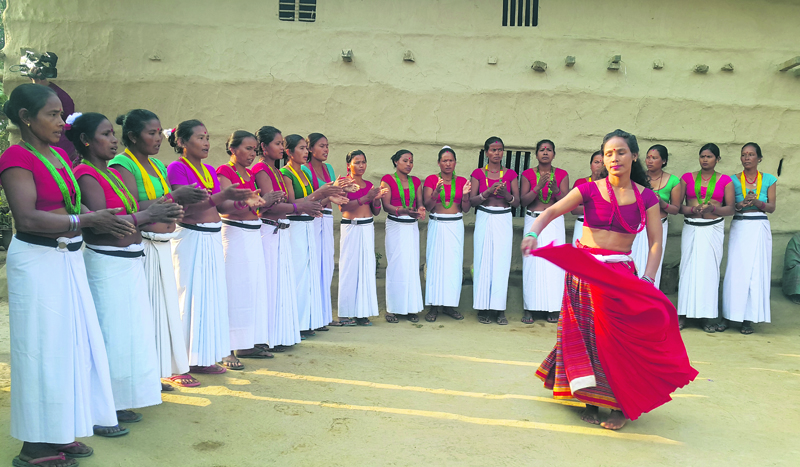
OR
Maghi celebration

BANKE, Jan 14: 85-year old Buddha Tharu of Baijapur village looks quite upset these days. The factor behind his unhappiness is the lack of excitement among the young Tharus for celebrating the festival of Maaghi. “People have stopped loving and celebrating Maaghi the way it was done in the past. This is not a pleasant matter,” laments the octogenarian. “They don't rejoice eating even Dhikri, Ghongi these days. This attitude is relegating to a mere formality, not something organic that the community loves,” he added.
Baijapur village, across the Rapati River is well known for Tharu settlement. Over 80 percent of the households in the village are that of Tharus. In the past, the arrival of the festival of Maaghi that falls on Saturday, 13 January, this year, would create different atmosphere in the village. The Tharus would feel the charm well before a week of Maaghi and celebrate the main day with great fervor and warmth. “There is nothing like that nowadays. The new generation has not been able to embrace the real beauty of Maaghi,” said Buddhi.
Maaghi meant resonating of the beats of Madal (a popular Nepali musical instrument) in the entire village through out the week leading to the festival day. That would spread positive vibes all around and give the rich feel of the colorful festival.
Buddhi feels that one of the reasons of the lack of excitement over the festival could be migration of youths for foreign countries for employment. A huge number of Tharu youths have gone to Gulf nations for employment.
Get together of locals in the evenings for singing and dancing from few days prior to Maaghi was a kind of ritual which has been forgotten now, Buddhi said. On the day of Maaghi, waking up very early morning and taking bath in Holy River was also very important and the new generation is not following that either, he said worrying for the tradition. “Boys of almost every house are abroad. In their absence, women are the ones who celebrate it. Few men are here, but even they do not show the zeal to celebrate the festival,” Buddhi noted.
On the day Tharus take early-morning bath in river, put red tika on their forehead, greet each other and enjoy authentic special Tharu cuisines to mark the day. But Buddhi said that these rituals are not followed thoroughly nowadays.
An elderly woman unhappy over the decreasing value of Maaghi is Belpati Tharu. She was considered one of the best Madal players in the village. She would be praised also as an amazing dancer. “But where would we find such times again? Neither they play madal nor dance like we did. In fact, there is dearth of youths with such zeal in the village,” Belpati said.
Belpati further reminisced that men and women used to organize separate special Maaghi dances. These dance used to be so thrilling, she said, that they excitement used to last throughout the year. “Maaghi these days is for name sake. Our culture, tradition is dying,” she lamented.
Not only migration of youths to foreign countries for employment, but also the growing use of mobile phones and internet in villages is taking toll on traditions, Laxmi Chaudhari of Baijapur believes. She feels that at least a vibrant festival like Maaghi should not have lost its charm, but 'modernism' has challenged it, too. “We no more see dancing groups like we had in the past. Organizing dance programs, visiting door to door, and organizing grand celebration program is now a thing of the past,” Laxmi said. “As the young generation is busy with mobile and internet, there are none to organize cultural programs for marking the festival.”
Laxmi reminisces fondly how she used to enjoy during Maaghi when she was younger. Like Belpati, she was also counted as a fine dancer among her peers and that would make her feel proud of herself.
Lahuram Tharu opined that to keep a culture, tradition or festival alive, the new generation should involve in it with the will power to carry it on. “But in our context, our youths are forced to go to Gulf countries; those who are here are living with their own frustration, too. All this is affecting our society and culture,” he asserted.
You May Like This

Mourinho worried by Man United's 'very bad' pre-season
July 19: Manchester United manager Jose Mourinho is worried by the absence of key players from the club’s pre-season training camp... Read More...

Petrol dearer by Rs 2 per liter; diesel and kerosene by Rs 3
KATHMANDU, May 2: Nepal Oil Corporation (NOC), the state oil monopoly, has hiked the price of petrol, diesel and kerosene... Read More...

Atletico 'nervous and worried' by Torres neck injury (video)
Fernando Torres's head injury shocked his Atletico Madrid team mates as the striker had to be carried off on a... Read More...




Just In
- Govt receives 1,658 proposals for startup loans; Minimum of 50 points required for eligibility
- Unified Socialist leader Sodari appointed Sudurpaschim CM
- One Nepali dies in UAE flood
- Madhesh Province CM Yadav expands cabinet
- 12-hour OPD service at Damauli Hospital from Thursday
- Lawmaker Dr Sharma provides Rs 2 million to children's hospital
- BFIs' lending to private sector increases by only 4.3 percent to Rs 5.087 trillion in first eight months of current FY
- NEPSE nosedives 19.56 points; daily turnover falls to Rs 2.09 billion















Leave A Comment